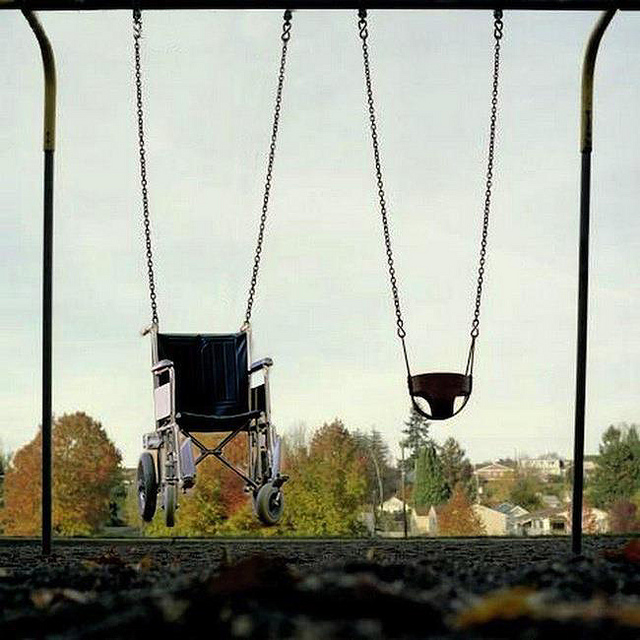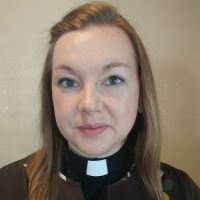His disciples asked him, “Rabbi, who sinned, this man or his parents, that he was born blind?” Jesus answered, “Neither this man nor his parents sinned; he was born blind so that God’s works might be revealed in him.” – John 9:2-3
I was born with one arm. I was ten when I overheard my mom tell the story of bringing her newborn daughter to worship, only to be confronted by another member of the congregation insisting that one or both of my parents was being punished by God sending them a child with one arm. Why would an infant have a disability if not for the sin of her parents?
Experiences like these have left me asking: is that what the church thinks of people with disabilities? That our disability, whatever its form or origin, is a sign of God’s displeasure? I wonder what might have changed if my mom had instead heard: “Your daughter is fearfully and wonderfully made in the image of God, part of the same body of Christ with all. This is not because of any sin, but through this child God will be revealed.”
I am quite certain that no one said that to me, neither directly in conversation nor indirectly in a sermon. I am equally certain that when the church is silent, it sends a strong message that it either agrees with or can’t be bothered to reject the messages that are spoken.
Despite the silence sometimes offered by the church, I am convinced that I am as fully made in the image of God as any person with two arms, as any person with Down Syndrome, as any person who is deaf, as any person with fibromyalgia. We are all of us the image-bearers of God, just as we are members of the body of Christ. And as members of the body of Christ, no one may say to any other that we are not needed, not wanted, not fearfully and wonderfully made.
How then shall the preacher consider preaching + disability?
Disability itself is a vast label. There are physical disabilities, developmental disabilities, learning disabilities, and mental disabilities, to name a few categories. The label “disability” is further complicated by differences of opinion or categorization on exactly what qualifies as a disability. Based on 2010 Census data and definitions, 19 percent of Americans have one or more disabilities (US Census Bureau). The thoughtful preacher must consider that nearly one in five parishioners has a disability of some sort.
Given the prevalence of disability in our congregations, it is critical that preachers make it very clear that disability is not sin. When faced with one of the many, many healing stories in our lectionary, the preacher does well to remember that when Jesus healed, he was restoring the person with a disease or disability to the community from which they had been excluded (for example Matthew 8:1-4). When preachers and congregations deliberately create space for people with disabilities in our communities, we are doing the very work of Jesus.
Preachers, you have an opportunity to speak carefully and thoughtfully from the pulpit. Consider that an amputee will hear the phrase “it costs an arm and a leg” differently. Consider that a person with vision loss might understand “was blind but now I see” differently. Including people with learning disabilities might mean emphasizing that faith is a gift of God, not a set of propositions to be understood and internalized. Consider that your sermon illustrations can include everyday people with disabilities, not as victims to be pitied, but simply as people facing their own struggles by the grace of God.
Because healing stories are so prevalent in the gospels and elsewhere in the Bible, there are many opportunities for preachers to address disability in sermons. Other opportunities include:
- 1 Corinthians 12:12-31 (Epiphany 3C): All are members of the body of Christ and should be valued as such.
- Genesis 1:1-2:4a (Easter Vigil ABC, Trinity A, Baptism B): Humans are made in God’s image, and each of us bears that image uniquely.
- Psalm 139:1-6, 13-18 (Pentecost 7A, Epiphany 2B, Pent 16C): Each person is “fearfully and wonderfully made,” is especially helpful for addressing congenital disabilities not as punishment for sin but as part of that person’s created being.
- 2 Corinthians 12:2-10 (Pentecost 6B): Especially note Paul’s “thorn in the flesh.” Paul was an important early Christian, and from his description, seemed to suffer from a physical disability or chronic disease of some sort.
In this regular Working Preacher column, “Preaching + _____,” writers incorporate lived experience into preaching upcoming texts from the Revised Common Lectionary.

